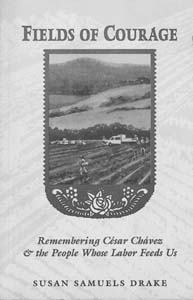![[MetroActive Books]](/books/gifs/books468.gif)
[ Books Index | Santa Cruz Week | MetroActive Central | Archives ]
César In the Round
Poet Susan Samuels Drake celebrates César Chávez as a human being, not a saint
By Mary Spicuzza
CONFESSING A HATRED for César Chávez would normally win an author as many popularity points as cheering for Gandhi to starve to death. Like Martin Luther King Jr. and Mother Theresa, Chávez--labor leader and father of the United Farm Workers union--rose to saintly status long before his death in 1993.
So most who pick up Santa Cruz resident Susan Samuels Drake's collection of poetry, Fields of Courage, will take one look at the book's title and cover painting featuring farm workers in idyllic fields and assume it's merely another ode to St. César. But Drake is far too sophisticated for that. Instead she celebrates the legendary hero by presenting him as a human being rather than a divine entity.
"I have never loved nor hated anyone as much as I love and hate César Chávez," Drake admits in the introduction. But she goes on to explain that Chávez was like a father during the more than 30 years she spent as his personal secretary.
The collection at times plunges into overly sentimental remembrances of Chávez, especially in the first piece, "Portrait--1962." This and other gushing poems dot the book but do not dominate it. Instead, Drake's collection shines due to pieces that highlight her honest voice as she presents an image of Chávez as utterly and completely human, or what she calls a "touchable hero." In "Knuckles," for instance, Drake writes, "God, he's/driving/me/CRAZY./But do you tell a man/whose picture's been on the cover of Time magazine/that cracking his knuckles is irritating the hell out of you?"
Somehow, just reading a few lines about César Chávez as a short, knuckle-cracking hothead makes him far more interesting than volumes of biographies describing him as a saint.
Occasionally, Drake does slip into romanticized images of farm workers--a phenomenon that seems inevitable when upper-middle-class types join working-class social-justice movements. Still she fully acknowledges her privileged place in the labor movement in "Where We Came From": "The Chávez house in San Jose sat/in el barrio/ called Sal Si Puedes--Get Out If You Can./Mine, twenty miles away, was in another enclave/called Palo Alto/ which might as well have been called/Get In If You Can Afford To."
DRAKE'S BEAUTIFUL WAY with words proves that poetry can teach more about the past than many textbooks--which until recently all but ignored the farm-worker movement. "Faces/desert-dry crevassed skin/brown eyes struggling for sparkle," she writes in "History." "Flat-line mouths shaping prouder by the year/Faces tell truer history."
Fields of Courage also brings together rare portraits of Chávez and his beloved farm workers. The collection includes photographs of the labor leader dancing with his mother and speaking with Robert Kennedy at the famous Delano grape-workers' strike. And pictures of UFW supporters like Carolina Vasquez, captured at a march wearing a large crucifix and bearing a dripping candle, prove that much of Chávez's story can be seen in the eyes of his followers.
The collection loses some of its power when Drake drops into awe for Chávez and romantic images of farm workers. Its strength lies in the poet's ability to balance respect with razor-sharp honesty, as in the best of love poems.
Drake's book proves that if readers want fluff, public relations people are perfect. But those who want the truth should just ask the secretary. Some critics have accused her of weakening the movement by smearing Chávez's image. Yet the perfect-saint pedestal is unstable ground, and Drake's honesty gives greater power to her hero by allowing him to be human.
Acknowledging that some won't appreciate her honest voice, Drake begins her last section with a quote from Henry David Thoreau. It reads, "Truth and roses surround themselves with thorns."
Copyright © Metro Publishing Inc. Maintained by Boulevards New Media.
![]()

Fields of Courage: Remembering César Chávez & the People Whose Labor Feeds Us
By Susan Samuels Drake
Many Names Press, Santa Cruz; 149 pages; $14.95 paper
From the March 1-8, 2000 issue of Metro Santa Cruz.